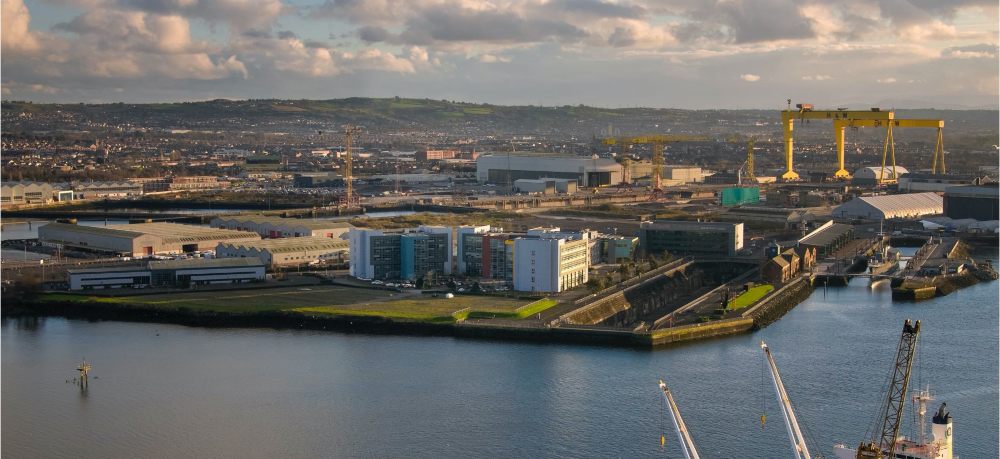New research shows infrastructure provision for the North and Western region of Ireland is lower than ‘less developed’ regions of Europe.
The Northern and Western Region of Ireland received just 5.7% of investment in infrastructure projects worth more than €20m since 2016.
That’s according to new research by the Northern and Western Regional Assembly (NWRA).
“We need to grow the economy in a manner that benefits all regions – not just the few”
NWRA is urging the Government to fast-track the delivery of 13 major infrastructure projects in the Northern and Western Region of Ireland after a new study found that the region is now on par with the least well-off areas of Europe in terms of infrastructure.
The research indicates that investment in transport, health, education, housing and energy infrastructure in the Northern and Western Region is languishing far below that of its counterparts in Ireland and across the continent – with transport infrastructure ranked the 17th worst of 234 European regions.
Infrastructure deficit
“Given the exceptional growth of the Irish economy – and the abundance of Exchequer returns in recent years – it is remarkable that the Northern and Western Region of Ireland is in the bottom 20 EU Regions in terms of transport infrastructure”
The NWRA is one of three regional assemblies in Ireland and represents counties Cavan, Donegal, Monaghan, Leitrim, Sligo, Roscommon, Mayo, Galway.
The Northern and Western Region of Ireland is officially classified as a “Transition Region” as it has a GDP per capita between 75% and 100% of the EU average, the only region in Ireland to hold such a status. However, the NWRA’s research has found that, in terms of competitiveness, the Northern and Western Region of Ireland ranks below some regions categorised as “less developed”, which are regions with a GDP per capita less than 75% of the EU average.
To bridge the growing infrastructure deficit, the NWRA is demanding that the Irish Government ringfence more than half of the European Regional Development Fund (ERDF) for the Northern and Western Region of Ireland and prioritise 13 infrastructure projects for the region. These include the delivery of the Donegal T-Ten road projects and N17 Knock to Collooney Road Scheme, and the reopening of the Western Rail Corridor from Athenry to Collooney.
The report estimates that the total capital cost of delivering these 13 priority projects would range from €4.8bn to €6.8bn, which would deliver transformative benefits in areas of climate action, regional development and the all-island economy, while costing considerably less than the overall cost of the Dublin Metro.
“We need to grow the economy in a manner that benefits all regions – not just the few,” urged Denis Kelly, director with the Northern and Western Regional Assembly.
“Adopting a regional approach for the revised National Planning Framework will be crucial to overcoming these sizeable infrastructure deficits in the Northern and Western Region.
“Delivering on these 13 priority infrastructure projects will go a long way in achieving this. These absolutely essential – and urgent – projects include the Donegal Ten-T Projects, the N2 Clontibret to the Border and the A5 road scheme – and the expansion of higher and research education infrastructure assets in the region.”
Regional infrastructure tracker
The organisation’s ‘Regional Infrastructure Tracker has for the first time harnessed data from public and private sources to reveal that, since 2016, the Northern and Western Region of Ireland has received less than 10% of the nationwide total investment in infrastructure projects worth more than €1m, and just 5.7% of investment from infrastructure projects worth more than €20m, despite accounting for 17.6% of Ireland’s population.
By contrast, the Eastern and Midlands Region of Ireland received 66.5% of investment from projects worth more than €1m, and 75% of those worth more than €20m. As the Eastern and Midlands Region accounts for less than 50% of the population of Ireland, the NWRA believes the figures reveal an obvious bias towards the Greater Dublin Area.
“Given the exceptional growth of the Irish economy – and the abundance of Exchequer returns in recent years – it is remarkable that the Northern and Western Region of Ireland is in the bottom 20 EU Regions in terms of transport infrastructure,” said John Daly, Economist with the Northern and Western Regional Assembly.
“With notable underinvestment also evident across the region’s higher education, research, water, road and rail network, it is no surprise to see that regional inequalities in Ireland have continued to rise as population, employment and income growth remains overly concentrated around the Greater Dublin Area.
“In addition to this, the level of underinvestment in the region also has the potential to contribute to greater political discontent, with ample research from the OECD noting that rising regional inequalities tend to undermine the trust of regional voters in national governments and lead voters to more extreme political parties or choices.
“All this considered, the delivery of our 13 priority infrastructure projects – at a cost of between €4.8bn to €6.8bn – represents significant value for money for the State in the long-term, with the delivery of these projects having the potential to rejuvenate our region, while simultaneously supporting our climate targets and growing the all-island economy; all at a cost considerably lower compared to, for example, the latest cost estimates for Dublin Metro,” Daly urged.
Main image at top: Launching the Regional Infrastructure Tracker for the Northern and Western Reigon on the N17 Collooney to Ireland West Airport Knock route are John Daly, NWRA economist, Cathaoirleach Jarlath Munnelly, NWRA directror Denis Kelly and Cllr Niamh Kennedy, Donegal County Council. Picture:James Connolly
-
Bank of Ireland is welcoming new customers every day – funding investments, working capital and expansions across multiple sectors. To learn more, click here






